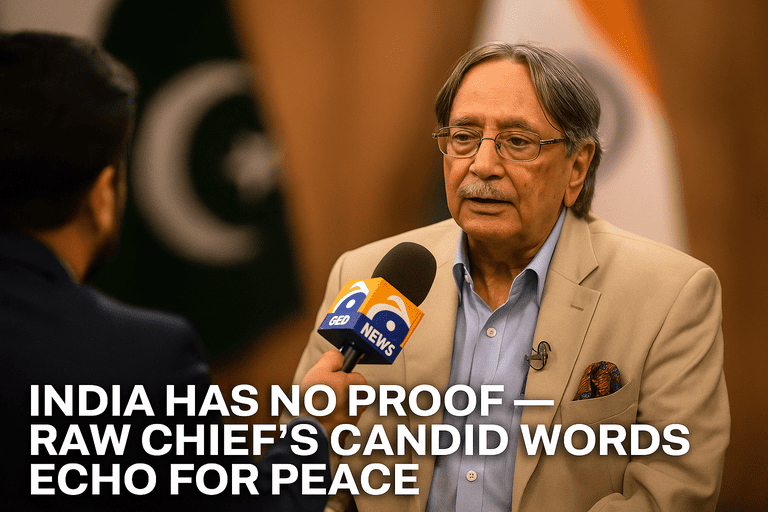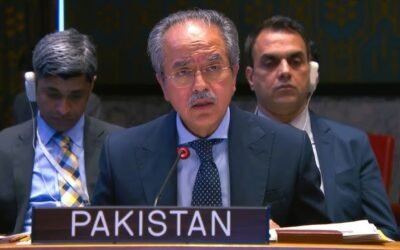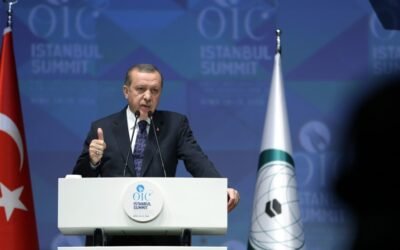India Has No Proof of Pahalgam Incident
“India does not have any proof regarding Pakistan’s involvement in the Pahalgam incident,” said Amarjeet Singh, the former chief of India’s intelligence agency RAW. He made this candid remark during an interview with Geo News in London, adding that Pakistan is consistently making efforts toward improving ties. Singh also congratulated Pakistan on Field Marshal Asim Munir’s luncheon with Donald Trump in the U.S., and encouraged Pakistani leadership to visit New Delhi, emphasizing that the peace process should not stop. Singh praised Pakistan’s unmatched hospitality and noted that he is the only RAW chief to have visited Pakistan four times after retirement.
Who Is Amarjeet Singh?
Amarjeet Singh is a former chief of RAW (Research and Analysis Wing), India’s primary external intelligence agency. He held one of the most sensitive and powerful positions in Indian intelligence, overseeing foreign espionage and counterterrorism strategies. Unlike many of his peers, Singh has openly supported diplomatic engagement with Pakistan and is notably the only RAW chief to have visited Pakistan four times after retirement, a fact that underscores his inclination towards regional stability and cross-border dialogue.
A Surprising Revelation from India’s Ex-Spy Chief
Singh’s declaration that India has no evidence to support its allegations against Pakistan in the Pahalgam incident is both rare and significant. Indian authorities have historically accused Pakistan of sponsoring cross-border terrorism, particularly in Kashmir. However, Singh’s statement directly undermines such narratives and calls into question the basis for India’s aggressive rhetoric.
Given his former role as the country’s top intelligence officer, Singh’s words carry considerable weight, especially in the eyes of international observers and diplomatic communities. His acknowledgment breaks the traditional silence surrounding intelligence failures and misattributions.
Praising Pakistan’s Diplomacy and Asim Munir’s U.S. Visit
In the same interview, Singh lauded Pakistan’s active role in regional diplomacy, particularly under the leadership of Field Marshal Asim Munir, Pakistan’s Army Chief. Referring to a high-profile luncheon hosted by former U.S. President Donald Trump in Asim Munir’s honor, Singh congratulated Pakistan and interpreted the event as a testament to Pakistan’s improving global standing.
“Congratulations to all of you on the luncheon hosted by Donald Trump in honor of Field Marshal Asim Munir,” Singh remarked.
Singh highlighted that Pakistan has consistently taken the initiative to normalize ties and promote dialogue, which, according to him, is why its leadership is being welcomed internationally.
“This Process Must Not Stop”—A Call for Pakistani Leadership to Visit India
Perhaps the most diplomatic moment in the interview came when Singh urged Pakistani leaders to reciprocate goodwill by visiting New Delhi. His call was not just symbolic—it reflected a genuine belief that sustained engagement is essential for resolving longstanding issues between the two neighbors.
“This process must not stop—Pakistani leadership should now visit New Delhi,” he stated.
Singh’s message stands in contrast to the often hawkish tone adopted by many Indian officials, suggesting that backchannel diplomacy and people-to-people contact are equally vital in conflict resolution.
“No One Can Match Pakistan’s Hospitality”
Another standout remark from Singh was his praise for Pakistan’s hospitality, which he described as unmatched globally. While this may seem like a small gesture, it further demonstrates Singh’s appreciation for cultural diplomacy and human connection beyond political divides.
Such sentiments are unusual for someone who once headed RAW—a department known more for secrecy than sentiment. Yet Singh’s words reflect a deeper understanding that peace is built not only through policy but also through mutual respect and acknowledgment of each other’s values.
A New Chapter for India-Pakistan Dialogue?
The significance of Amarjeet Singh’s statements lies not only in what he said, but in who said it. Coming from a former RAW chief, these comments challenge deeply entrenched narratives and invite a more balanced discussion on cross-border relations.
His views also raise questions about how many such accusations—like the one surrounding the Pahalgam incident—may lack substantiation. If more voices from within India’s strategic community echo Singh’s sentiments, it could pave the way for a long-overdue shift from confrontation to conversation.







